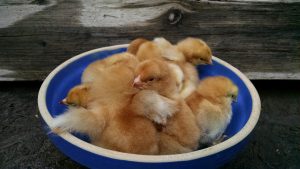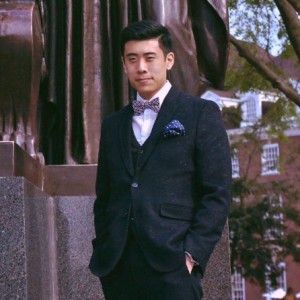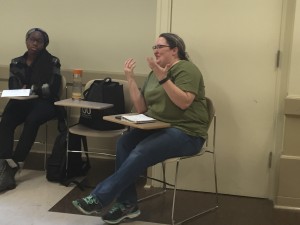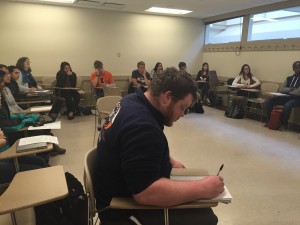Read on for details of the award-winning entries in this year’s undergraduate creative writing details. Congratulations to Christopher Canty, Carolyn Aiello, Jenna Beebe, Meghedi Tamazian, Siggi Schroth, and Steven Waddell!
FICTION
Jensen Beach, this year’s judge, is the author of two story collections, most recently Swallowed by the Cold (Graywolf). He holds an MFA in fiction from the Program for Poets and Writers at the University of Massachusetts, Amherst, as well as an MA and BA in English from Stockholm University. He teaches in the BFA program at Johnson State College, where he is the fiction editor at Green Mountains Review. He’s also a faculty member in the MFA Program in Writing & Publishing at Vermont College of Fine Arts. His writing has appeared recently in A Public Space, the Paris Review, and The New Yorker. He’s a former web editor at Hobart. He lives in Vermont.
Sixty-two writers submitted stories. Below are the winners and the judge’s comments.
John L. Rainey Prize, $1,000 (sponsored by Alpha Delta Phi Fraternity): Christopher Canty, “Delivery.”
This winning story is so full of energy and humor. I was immediately drawn in and held fast. The story is relevant in its cultural and pop-cultural references and themes; and though the story is about young people and seems to present certain plot elements that might seem trivial or immature, it remains incredibly resonant. Tonally, the piece excites in its colloquial approach. This voice generates a great deal of humor in thought as well as event; and yet the writer never sacrifices emotion for a joke. Indeed, as the story builds toward its tender conclusion I found myself drawn as much to the exciting and richly rendered phrases as I was to the gentleness of the protagonist. This is a character who, in spite of himself, is undeniably kind, thoughtful. And the story hinges on this quality even as it feints toward its protagonist’s haplessness, his ability to only ever do what is not right. It’s a surprising and pleasing irony of the piece and I was enormously impressed.
Josephine M. Bresee Memorial, $400: Carolyn Aiello, “Post-Thanksgiving Party.”
This is a fun, quirky story with a confident and compelling narrative voice. The writer works with some familiar tropes and milieux–the suburban household too full of parties to host and social and professional ladders to climb; and these spaces are, as they always are, occupied humorously and yet humorlessly by a male character about which are meant to laugh and cringe and, in the end, sympathize with. But this is a story that pushes its boundaries of these expected plot points neatly toward something rich and textured. Though I think at times the story hemmed too closely to territory in which it was, perhaps, too happy with its own oddities and jokes, for the most part I found the story delightful and accomplished.
Leah Trelease Prize, $300: Jenna Beebe, “All the Time in the World.”
Here is a quiet story that works well on a number of levels. The story of a young woman who goes home for the funeral of a loved one, “All the Time in the World” draws from a familiar well of lived experience. And yet it manages to transcend this set up, to burrow into its own humility, its own true account of what it is to be human. I enjoyed the story a great deal.
POETRY
Amie Whittemore, judge of this year’s contest and once upon a time a double major in English and Creative Writing here at the University of Illinois, is a poet, educator, and the author of Glass Harvest (Autumn House Press). She is also co-founder of the Charlottesville Reading Series. An instructor at Middle Tennessee State University, she holds graduate degrees from Lewis and Clark College (M.A.T.) and Southern Illinois University Carbondale (M.F.A.). Her poems have appeared in The Gettysburg Review, Sycamore Review, Rattle, Cimarron Review, and elsewhere.
Seventy-five writers submitted poems. Below are the winners and the judge’s comments.
Folger Adam, Jr. Prize, $1,000 (sponsored by Alpha Delta Phi Fraternity): Meghedi Tamazian, “Everyday.”
What immediately drew me to these poems is their study of transformation. In “Everyday,” the winner of this year’s poetry contest, the speaker inhabits a space of restless investigation, oscillating from a desire to “move toward hot water” and, on other days, “to cut off all my hair.” As the writer moves us through these indecisions and revisions, one clear wish, for “a heart that can take all of this,” emerges, vulnerable and unexpected. The poet wonderfully uses magical realism and absurdism in this poem and others, to investigate the nature of the self in relation to the world. In “A Sort of Pardon,” the speaker finds “a spider inside my mouth,” and a “house inside of a house, both harboring parched wood / and a familiar smell.” Thanks to the writer’s control, these startling images feel perfectly apt. The poet has created a unique and strangely unifying logic. It was a pleasure to enter into this world full of heart and verve.
Charles and Susan Shattuck Prize, $500: Siggi Schroth, “Arkansas Corn Queen on the Eve of Her Retirement from Teaching Contemporary Mathematics.”
The intelligence and sense of humor in these poems is marvelous. It’s clear from the title of the first poem, “Arkansas Corn Queen on the Eve of her Retirement from Teaching Contemporary Mathematics,” that we are in the hands of a poet whose inspiration is found in observation of the human condition, particularly its fallibility: the Corn Queen, “painted the boniest parts of her hoof,” “teetering on those sharp, flaking things.” Later, in the poem “he believes his hands are not visible,” the speaker criticizes a man who seduces women. However, the poet’s ambitions carry us beyond that subject, and we look at the very idea of “technique,” in terms of seduction, yes, but also elsewhere: “a tray is just /a technique for carrying / six things at once,” and later, “a technique / is just another system, / just another boss.” The way the speaker shifts our understanding of this word is sophisticated and provocative. This poet’s straightforward voice inspires trust, so that we can enter new territories, engage with strangers on the train, even observe a friend, passed out on the floor, who isn’t “as dead as we thought.” Strange, wonderful poems.
American Academy of Poets Prize, $100: Steven Waddell, “Then/Now.”
Writing a political poem is never easy and the writer of “Then / Now,” takes on this task with heart and grit. In the first section, “Then,” the speaker shows us a black man on the run from a possible lynching; a difficult topic, on multiple levels, that the speaker navigates through a mixture of startling, precise imagery and variations in line length that control the pacing and revelation of information. The man’s “purple feet” trail blood and “burst open…like an unripe plum.” The image of the plum, soft and gentle, in the midst of the terror of the man’s escape forces the reader to pause, to really see this man as an individual not an archetype. Later, in “Now,” the writer creates a parallel scene, featuring a black man in a tense confrontation with a police officer. Again, the precision of images grounds the poem: the man’s “ankles were magnets drawn tight displaying that he would not try to run” and his “mouth perched ready to explain his reason for existing.” Later the man’s blood “graffitied the pavement.” But first–first, the man’s mouth “was open wide enough to swallow galaxies.” To carry all of this weight, of the fraught past and the fraught present in a single poem, is to attempt to swallow a galaxy. I admire deeply this poet’s ambition to confront darkness.


 Our definition of success has morphed over the last four years from one calculated in terms of finance to one gauged by the less tangible and far less popular measure, of satisfaction. Where once we considered ourselves “successful” due to our six figure earnings (combined nursing and farming income), we also succumbed to the pitfalls of that prosperity: less time for each other, our children and grandchildren, serious health issues, and little opportunity to pursue hobbies or activities that gave us pleasure. We had, like so many others in our American society of More Is Best, worked ourselves into near collapse.
Our definition of success has morphed over the last four years from one calculated in terms of finance to one gauged by the less tangible and far less popular measure, of satisfaction. Where once we considered ourselves “successful” due to our six figure earnings (combined nursing and farming income), we also succumbed to the pitfalls of that prosperity: less time for each other, our children and grandchildren, serious health issues, and little opportunity to pursue hobbies or activities that gave us pleasure. We had, like so many others in our American society of More Is Best, worked ourselves into near collapse. farm business or get out. We elected the second option. I retired from nursing, we sold our big farm and bought a smaller farm without housing. Living in a 160 square-foot camper for six months while we converted a grain bin into a tiny home solidified our goal to live small on a tiny income,
farm business or get out. We elected the second option. I retired from nursing, we sold our big farm and bought a smaller farm without housing. Living in a 160 square-foot camper for six months while we converted a grain bin into a tiny home solidified our goal to live small on a tiny income,
 deciding upon a definitive career path within the next two years.
deciding upon a definitive career path within the next two years. field for English/CW majors and anyone else interested in making creative content, but it’s also highly competitive, drawing people from a wide range of fields who love video games. To learn more about how English/CW and other humanities majors can position themselves to enter this industry, we brought Anne Odom to campus on April 12. Anne works as a project manager for DS Volition, the video game company here in Champaign. It’s not the career one might expect from someone who majored in philosophy and minored in Russian literature in college, but Anne argues that her experience in making arguments. wrestling with complex material, and using her intellectual curiosity has helped her be good at what she does.
field for English/CW majors and anyone else interested in making creative content, but it’s also highly competitive, drawing people from a wide range of fields who love video games. To learn more about how English/CW and other humanities majors can position themselves to enter this industry, we brought Anne Odom to campus on April 12. Anne works as a project manager for DS Volition, the video game company here in Champaign. It’s not the career one might expect from someone who majored in philosophy and minored in Russian literature in college, but Anne argues that her experience in making arguments. wrestling with complex material, and using her intellectual curiosity has helped her be good at what she does. s stretch ahead of you. If your summer location doesn’t give you much scope for a career-focused job, if you need to make money waiting tables instead of taking an unpaid internship, if you left it too late to find a resume-building opportunity…you can always make something.
s stretch ahead of you. If your summer location doesn’t give you much scope for a career-focused job, if you need to make money waiting tables instead of taking an unpaid internship, if you left it too late to find a resume-building opportunity…you can always make something.